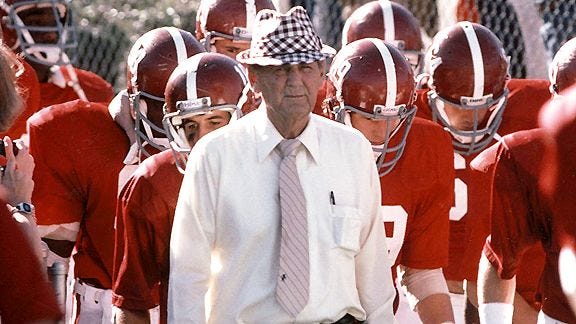Does Defense Really Win Championships??
How important is a good defense in the quest for a college football national title?
Six-time national champion winning coach and Alabama football legend Paul “Bear” Bryant once said "Offense sells tickets, but defense wins championships." This week, the quarterfinals of the College Football Playoff will take place. During any sport’s championship season, fans and analysts alike dig into the question: “What makes a championship team?” Is it an unstoppable offense? An impenetrable defense? Or some harmonious combination of the two? Let’s play myth-busters for a moment and dive into the validity of the saying “defense wins championships” in college football.
Champions Rely On Defense (…But Only Slightly)
Dating back to 1958 — 66 complete seasons, not including 2024 — the average DI/FBS college football national champion had a Defensive SRS, per Sports Reference, of 12.68, compared to an Offensive SRS of 10.56. SRS, or “Simple Rating System”, is Sports Reference’s rating system that takes into account average point differential and strength of schedule.1 Offensive SRS (OSRS) and Defensive SRS (DSRS) are the offensive and defensive components that make up this metric. This difference of 2.12 points tells us that defensive skill is approximately 20% more important to winning a national championship than offense. However, the correlation between the two metrics an winning a championship is not very strong. The correlation coefficient between winning a championship and OSRS is a mere .147, and just a slightly higher .181 for DSRS. The correlation for defense is higher, yes, but at that low of a level — a correlation of .181 translates to the variable explaining just a tad over 3% of the outcome — can we really put much stock into it?
For what it is worth, the table below shows the past 68 national champions and the percentage of their overall SRS accounted for by their DSRS
What If We Look At The Rankings?
SRS levels can vary slightly between years, based upon parity, talent level, etc.… What if we looked at how teams ranked across college football in OSRS and DSRS? This is actually worse, with OSRS and DSRS having coefficients of just .131 and .144, respectively.
Was Bear Bryant Ever Right?
Bryant coached decades ago, with his final national championship coming in 1979. Is it that defense used to be the key, but times have changed? In the words of the beloved Lee Corso, “Not so fast my friend”.
Using a 7-year moving average (to tease out some noise and variability, and get a better view of the overall trend of the time period) of DSRS and OSRS, we see that over the past 60+ years, there have been fluctuations in whether or not champions are defensive or offensive-centric. In fact, the time period in which Bryant coached (1945-1982) as actually the most balanced in terms of defense and offense. Maybe Bryant was ahead of his time, as the largest gap between defense and offense rankings occurred just following his retirement, before a tide-change in the early-mid 2000’s.
The 2024 Playoffs Teams
The eight teams remaining in the playoffs are split between defense-heavy and offense-heavy, relative to what would be expected per their Associated Press (AP) ranking. Texas, Ohio State, and Penn State are defense-centered, while Oregon, Georgia, and Boise State rely more on their offense, with Notre Dame and Arizona State fairly balanced. The table below the chart shows that 7 of the 8 teams rank in the top-20 in Defensive SRS, with Boise State — which relies heavily on it’s Heisman runner-up RB Ashton Jeanty — being the exception, ranking a ghastly 52nd. Boise State is also the only team with an OSRS better than their DSRS (and by a whopping 6.2 points).
Conclusion
Better defensive teams are in fact better equipped to win championships. College football national champions, on average, have a defensive power rating 20% higher than their offensive power rating.2 However, the correlation between a team’s defensive rating or ranking and winning a national championship is quite low. Additionally, reliance on defense has shifted over time, with the 1980’s producing defensive-minded champions, the mid-late 2000’s being offensive-centric, and the 2010’s favoring defense. So while Bear Bryant may have been on the right track, a stalwart defense won’t guarantee a “natty”, but it’s surely an important component. We’ll see what kind of factor defense plays in this year’s championship pursuit as we finish out the playoffs.
For those so inclined, you can read more here: https://web.archive.org/web/20180531115621/https://www.pro-football-reference.com/blog/index4837.html?p=37
Per Sports Reference SRS statistics





It's interesting to me that for a sport as money hungry as college football that a quote like that one from Bear Bryant didn't result in the whole sport pivoting towards playing offensively. In all seriousness, I do wonder if this will change in the future. The committee has been known to overrate offensive teams in the past, and I wonder if more future playoff spots will be reserved for ticket sellers (i.e. this year's Miami team) instead of teams bult to win.